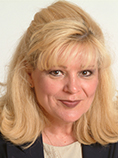Mtre Johanne Savard
Mtre Johanne Savard : a blend of rigour and humanity
By Pierre-Luc Beauchesne, lawyer
(Article published on August 18, 2020)

After studying Political Science at Concordia University, Mtre Savard completed her Bachelor of Law degree at Université de Montréal. While preparing for the Bar, she did a clerkship at the Court of Appeal of Quebec, mainly with Justice Amédée Monet and Justice Albert Mayrand. She then articled at Ogilvy Renault (now Norton Rose Fulbright), before being hired there as a lawyer and eventually becoming partner. In 1997, after more than 17 years with Ogilvy Renault, she joined Desjardins Ducharme, where she headed the Labour and Employment Law Group and sat on the Board of Directors.
Mtre Savard always practised labour and employment law. What she loved most about this area of law was the human aspect and the possibility of developing long-term relationships built on respect and trust, with both the client and the opposing party. Even in litigious contexts, Mtre Savard always remained sensitive to the importance of retaining her humanity: “To be a good lawyer, you have to demonstrate both great rigour and goodwill. Also, you must always bear in mind the impacts that your decisions can have on others.”
At Ogilvy Renault, Mtre Savard was especially appreciative of the vast experience, competence and rigour of her colleagues, with whom she developed special relationships. In fact, some still count among her best friends today. During her time at Desjardins Ducharme, she gained a better understanding of all the ins and outs of managing a large firm. This first management experience posed an interesting challenge and brought with it the realization that diplomacy is often de rigueur when managing professionals, particularly lawyers.
In 2003, this former synchronized swimmer made the big leap: she left private practice to become the first Ombudsman of Ville de Montréal, where immense challenges awaited her. There were no municipal ombudsmen in Canada at that time. The skills she had developed in private practice proved a great asset and good preparation for the colossal but very exciting task at hand. Drawing inspiration from what was being done in other countries and at other levels of government, over the years, she built a solid team over the years. Today that team consists of nine people. The Montreal Ombudsman handles an impressive volume of work. Between 2003 and 2019, Mtre Savard and her team processed more than 25,000 complaints and conducted over 3,000 investigations.
During her four terms in this post, she was actively engaged in numerous projects. In particular, Mtre Savard succeeded in convincing the City to limit access to the municipal courthouse’s criminal files when a person had been acquitted or the charges against him or her had been dropped. This major battle helped improve the life of citizens who were having difficulty finding jobs due to their criminal files, even if they had not been convicted. As Mtre Savard puts it, “the job of ombudsman requires you to be impartial, while developing a relationship of trust and openness with both citizens and the municipal administration. Everyone has to work together to find a solution. Even if ombudsmen are only empowered to make recommendations, their work nearly always paves the way to rectifying problematic situations, thus re-establishing a measure of justice for citizens and service users.”
For Mtre Savard, better access to justice starts with disseminating legal information in plain language. To prevent conflicts, citizens must, above all, know their rights, but also their obligations. Mtre Savard and her team thus worked with the City to revamp the templates for standard letters, using much simpler terms. She also wrote a guide on fair decision-making specifically for decision-makers to raise their awareness of the importance of having clear rules and ensuring that each party involved can express his or her viewpoint and feel that he or she is being heard and taken into consideration. For her, justice and humanity go hand-in-hand: “The courts are essential for confirming democratic values and the rules of law, but sometimes they have their limitations when it comes to applying them to particular cases, notably due to costs and time limits. When a conflict arises, it is important to be able to offer simpler recourse and processes that help citizens understand their rights and obligations. Above all, we must encourage decision-makers to show goodwill and take the impact of their decisions into account.”
Over the years, Mtre Savard has also been socially active in defending vulnerable people, for which she has been the recipient of numerous medals and awards. One of her main battle horses has been – and still is – the rights and inclusion of people living with a disability.
Mtre Savard has always been present for her husband André and son Alexandre despite her heavy schedule. In her mind, a successful life requires quality personal and family relationships. On the cusp of a well-deserved retirement, Mtre Savard remains driven by the desire to help others. She hopes to take advantage of this next phase of her life by spending more time with her family, but one senses that the years ahead may well mirror those behind, and that she will find a way to continue contributing to society and expressing her great humanity.

